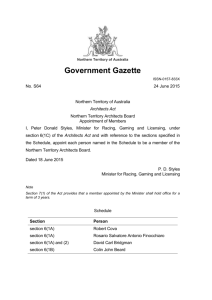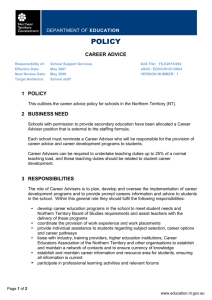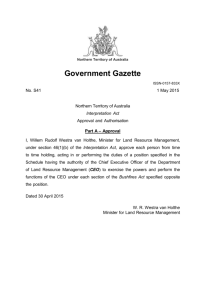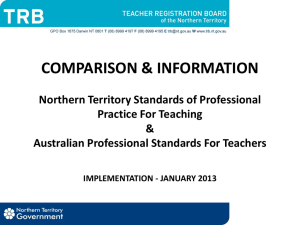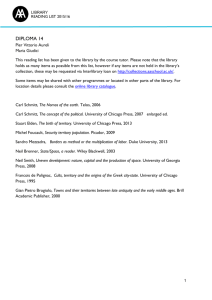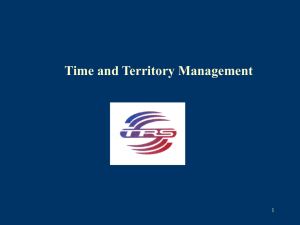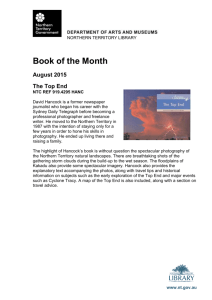Graduates Response Speech by Shane Dexter
advertisement
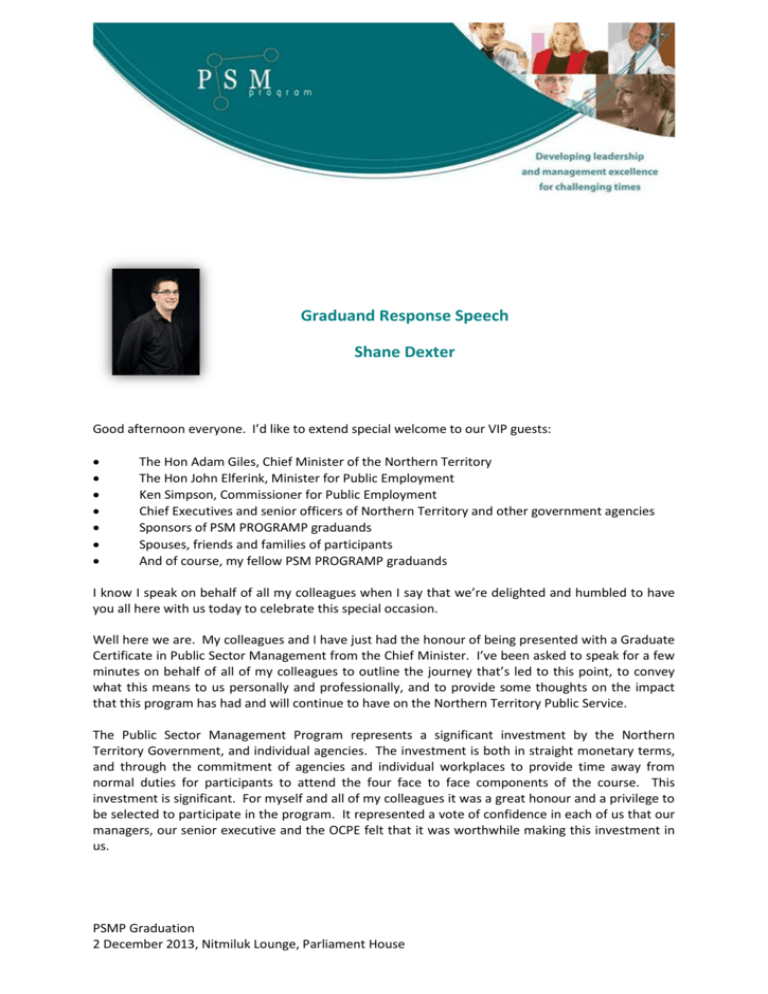
Graduand Response Speech Shane Dexter Good afternoon everyone. I’d like to extend special welcome to our VIP guests: • • • • • • • The Hon Adam Giles, Chief Minister of the Northern Territory The Hon John Elferink, Minister for Public Employment Ken Simpson, Commissioner for Public Employment Chief Executives and senior officers of Northern Territory and other government agencies Sponsors of PSM PROGRAMP graduands Spouses, friends and families of participants And of course, my fellow PSM PROGRAMP graduands I know I speak on behalf of all my colleagues when I say that we’re delighted and humbled to have you all here with us today to celebrate this special occasion. Well here we are. My colleagues and I have just had the honour of being presented with a Graduate Certificate in Public Sector Management from the Chief Minister. I’ve been asked to speak for a few minutes on behalf of all of my colleagues to outline the journey that’s led to this point, to convey what this means to us personally and professionally, and to provide some thoughts on the impact that this program has had and will continue to have on the Northern Territory Public Service. The Public Sector Management Program represents a significant investment by the Northern Territory Government, and individual agencies. The investment is both in straight monetary terms, and through the commitment of agencies and individual workplaces to provide time away from normal duties for participants to attend the four face to face components of the course. This investment is significant. For myself and all of my colleagues it was a great honour and a privilege to be selected to participate in the program. It represented a vote of confidence in each of us that our managers, our senior executive and the OCPE felt that it was worthwhile making this investment in us. PSMP Graduation 2 December 2013, Nitmiluk Lounge, Parliament House In my view this investment is clearly worthwhile. It goes without saying that completing the course will provide an enormous benefit to participants, expanding and strengthening our capabilities and equipping us with the skills to take the next steps in our careers. However, more importantly, this program also has an enormously positive impact on the broader Northern Territory Public Service, and therefore to the Territory as a whole. For this reason, investment in improving the skills and competencies of public servants is prudent, even in a challenging budgetary environment. The immediate and most tangible benefit that has already been realised is that each of us has now completed a work based project as the culminating assessable piece of work for the course. Every one of those projects was designed by the participant to address an issue in their workplace, and carried out by applying the studies that we’d undertaken throughout the first three parts of the course. The result is that we’re already learning to adapt the knowledge and understandings that we’ve picked up to actual problems and issues that are confronting the Northern Territory Public Service. In my case I designed a new methodology to provide accurate, detailed and up to date profiles on Northern Territory schools. That’s just one project, and every one of my colleagues will have a similar story about how they’ve already applied their learnings from this program to solve a problem or value add in a measurable way within their business areas and agencies. Chief Executives and other senior officers, if you’re not familiar with the work based projects that your graduates completed as part of this course I’d encourage you to have a chat with them and find out. But that’s just the immediate beneficial impact of the project. The real dividends are only just starting to emerge and will continue to pay off for many years to come. Tomorrow’s public sector leaders need to be equipped with the skills to not just manage or survive, but to thrive in an increasingly dynamic, innovative, uncertain, complex and globalised environment. In 2004, the then Australian Public Service Commissioner Andrew Podger outlined the change factors that the public service was grappling with at that time, and I believe they are all still relevant today. The factors he set out were: • • • • • Technology being the driver of globalisation A sharp increase in competitive pressures on the public sector Expanding community expectations of government The accelerating rate of change and The greatly increasing pervasiveness of change Since the New Public Management reforms of the 1980s and 90s, contemporary government agencies are no longer simply service providers, but a range of different things to different stakeholders. We are: • • • • • • • contract managers, we are partnership builders, we are people managers, we are innovators, we are stakeholder managers and project managers, we are only one of many policy advisors to government, we are constantly managing change on several fronts that impacts on stakeholders inside and outside our agencies. PSMP Graduation 2 December 2013, Nitmiluk Lounge, Parliament House And we are required to execute all of these roles concurrently in an environment where we, along with our Minister, are accountable to the 24-hour news cycle and the social media revolution – which makes every client, customer, supplier or other stakeholder a potential ‘reporter’ with an unlimited audience through Facebook or twitter. The improved leadership capabilities that my colleagues and I have developed through the PSM Program course will promote effective decision making as we navigate the inevitable complexities and challenges that will arise in the coming months, years and decades. Our role will include – and in some cases already includes - tackling the major societal issues, the wicked problems. This is the job of public sector managers everywhere but the Northern Territory provides some excellent examples of such issues that require the application of new thinking and great minds in order to drive sustained improvement in areas such as health, education and economic growth. The Northern Territory Public Service is responsible for providing advice to government on how to address some of the most vexed problems currently facing our nation such as: • • • • How can we build sustainable economies for people living in remote areas? How can we improve indigenous education outcomes and facilitate real pathways to jobs for Territory students? What should be done to address the gap between indigenous and non-Indigenous health outcomes? What strategies should we adopt to ensure a viable ongoing economy in North East Arnhem Land following the closure of the Rio Tinto alumina refinery? My colleagues and I here today, and thousands of other dedicated public servants, will be at the forefront of providing advice to government on these and many other complex issues in the coming months, years and decades. The skills and competencies that my fellow graduands and I have developed through the PSM Program ensures that we are now far better equipped to provide well researched, accurate, detailed and thorough advice to government on the most challenging issues that will confront the Northern Territory over the course of our careers. Compared to other jurisdictions, here in the Northern Territory our ability as individuals and as public sector managers to make a difference is enhanced because of our relatively small population. I cannot think of a better context where I’d rather apply myself to the major societal challenges, and I look forward to a long career in the Northern Territory Public Service Today is the culmination of around 16 months of studies, including: • • • • • A three day residential phase 12 days of face to face learning Four minor assignments Four major assignments Countless hours of Reading, research and study – usually to extend our knowledge in a particular subject area, but occasionally in a desperate search to find some material that would support an argument we were trying to make. writing, re-writing, then throwing out what we’d written and starting again proofing, re-proofing, double-re-proofing and then cursing our spouses when they pick up a dozen typos we’d missed the first four times meticulously referencing our sources to meet the very high standards of the Flinders University assessment panels PSMP Graduation 2 December 2013, Nitmiluk Lounge, Parliament House But most memorably and most importantly, this course gave each of us the opportunity to participate in countless hours of high quality professional discussion and debate with fellow students, with our facilitators and with our colleagues and managers in the workplace. Best of all, this part of the experience will continue throughout our careers as we refine and develop our knowledge and understanding of what it means to be an effective public servant. It’s our enhanced ability to participate in this ongoing dialogue and discussion that will be the greatest legacy of the PSM Program. It’s less about the facts, figures and theories that we’ve learnt through this program and more about the way that we’ve developed our ability to accept that we can’t possibly have all the right answers all the time. Our ability to be the one at a meeting to speak up and ask the silly questions. Our ability to have the courage to stop, to think, and to ask critical questions of ourselves and others. And most importantly our ability to engage with and learn from the people that we meet through our professional and personal lives. It’s these skills that the PSM Program course has developed in each of us that will have the most profound impact on the contributions that we will make to the Northern Territory Public Service into the future. My colleagues and I have poured countless hours into this program. We’ve done it willingly and – for the most part – with a smile on our face because we can see the benefits of our learning’s every day at work. However there are other people who have also poured a lot of time and effort into the program and I’d like to take a moment to thank them. • • • • • We each had a sponsor within our agency who was often also the person who supported us in applying for the program at the start. Our sponsor provided us with guidance throughout the course and had a large role to play in identifying a suitable work based project. I’d like to thank all the sponsors here today – and those who couldn’t make it – for your support. As I outlined earlier, each of our agencies has contributed both time and money towards our participation in the program. I want to thank the Chief Executives and other senior officers present today for supporting the program generally, and for supporting my colleagues and I individually throughout the program. The hardworking staff at the Office of the Commissioner for Public Employment coordinate the PSM Program and have done a marvellous job of supporting all of us through the program. There has been a bit of turnover of staff but the support has remained constant and I want thank in particular Pamela Cameron, Melissa Hanlon, Kini Tuiono, Kalotina Halkitis, Nicole Boucher and Karen Stoddard. I’d like to thank the Chief Minister and the Northern Territory Government for supporting the Public Sector Management Program, which has now been operating in most states and territories across Australia since 1991. Finally, I want to thank the spouses and families of all the participants in the program. You all have taken on the burden over the past 16 months every bit as much as my colleagues and I. You’ve put up with the late nights and weekends working away on assignments, the grumpiness and anxiety when it’s getting close to an assignment due date. In many cases you’ve been the filter for silly ideas and the final proof reader that’s scored us an extra few marks on assignments. For those of us with children you’ve been the sole parent for hours, days, nights and weekends. From each and every one of us, thank you. We love you and we couldn’t have got here without you! PSMP Graduation 2 December 2013, Nitmiluk Lounge, Parliament House I’d like to conclude with a quote from a television journalist and author from the USA by the name of Tom Brokaw. He has a passion for education and is often invited to speak at graduation events for American Universities. Although the context is a little left field, I think his words have a great connection to the Northern Territory where we, as public servants, grapple with some of the most challenging problems in society today. He said: You are educated. Your certification is in your degree. You may think of it as the ticket to the good life. Let me ask you to think of an alternative. Think of it as your ticket to change the world. Ladies and gentlemen, thank you very much. PSMP Graduation 2 December 2013, Nitmiluk Lounge, Parliament House

